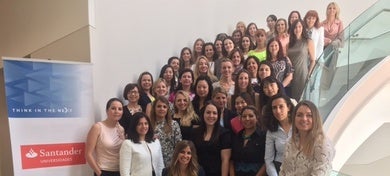Blogs Navigation
Sustainable BusinessRecent posts

Addressing gender-based violence from the private sector: the experience of Laboratorios Bagó
Francisco Méndez, CEO of the pharmaceutical company, shares his company's efforts and achievements in fostering an inclusive and safe work environment.

How Responsible Investments Can Empower Young Women and Girls in Miches While Boosting Tourism
In partnership with Fundación Tropicalia, IDB Invest fosters a more inclusive and sustainable growth path in the Dominican Republic by focusing on their untapped potential.

A Few Very Good Reasons to Protect the Integrity of Gender Bonds
Latin America and the Caribbean has become a leading region in gender bond issuance aimed at bolstering women’s empowerment. These instruments offer a promising capital market solution to mobilize funds towards projects that help accelerate parity.

What is the connection between No Impact Week and sustainable business?
I dare you: Can you buy nothing for a whole day? I know it sounds tough, but it happens on No Consumption Day. Employees who sign up for No Impact Week can experience how lowering our environmental footprint can impact quality of life, communities and planet. While No Impact Week is about discovering how lifestyle changes like consuming less can increase personal fulfillment, health, and happiness, it certainly begs the question: How is less consumption also good for sustainable business?

How to reduce your energy costs and become more competitive
These days, reducing production costs to increase competitiveness is a must. In a report titled Climate Solutions, the World Wildlife Fund notes that the world could cut its energy consumption by 40% by 2050 just by improving energy efficiency and energy conservation. But when looking for alternatives that don't sacrifice the quality of raw materials, not many entrepreneurs realize that a change in energy policy could save them a considerable amount on their energy bills.

Transformation of banks to reach unbanked: Cases from Jamaica and Paraguay
By Tomas Miller and Veronica Trujillo There have been remarkable advances in the role of banks in financial inclusion and development in Latin America and the Caribbean as measured by various indicators (access to bank accounts, supply of credit, insurance for micro and small enterprises, and availability of customer points of service) compared with levels in the previous decade. However, the region still falls short in terms of the overall penetration of its financial system and in comparison with other parts of the world. Access to and use of credit and savings—measured as the proportion of people that borrowed money or had savings accounts with formal financial institutions in the past year—reach only 11% and 14% of the region’s population, respectively. Also, the proportion of adults with any account at a financial institution or through a mobile banking provider is a mere 51%, compared with more than 60% globally, according to the The Global Findex Database 2014.

Sustainable Development Goals: The way forward for the private sector
An interview with Global Compact's Jaime García Alba on the Sustainable Development Goals In the coming days, world leaders from 193 countries will descend upon Addis Ababa, Ethiopia, for the Financing for Development Conference organized by the United Nations (UN). The goal will be to define a framework to implement the Sustainable Development Goals (SDGs) over the next 15 years. The private sector will play a key role, integrating business perspectives throughout the process.

Four ways to get more women on corporate boards in Latin America
Two weeks ago, Banco Santander invited 50 women to the University of California Los Angeles (UCLA) Anderson School of Management to participate in the W50 program. The W50 program is part of the Banco Santander Universities program. It builds on the decision of former Bank’s president Emilio Botín that Banco Santander should maximize its social impact through universities providing education and capacity building. Over 90% of Banco Santander’s Corporate Social Responsibility Program is invested in the Universities program, an investment of over US$240 (EUR 210) million in scholarships since 2005.

Water crises drive private sector innovation
Protecting areas that provide water through water funds highlights an innovative way to spur green growth driven by the private sector. With the on-going water shortages in Sao Paulo, Brazil, the region has a heightened awareness of the importance of securing water supply for big cities. Water supply links increasingly to deforestation and poor watershed management.


